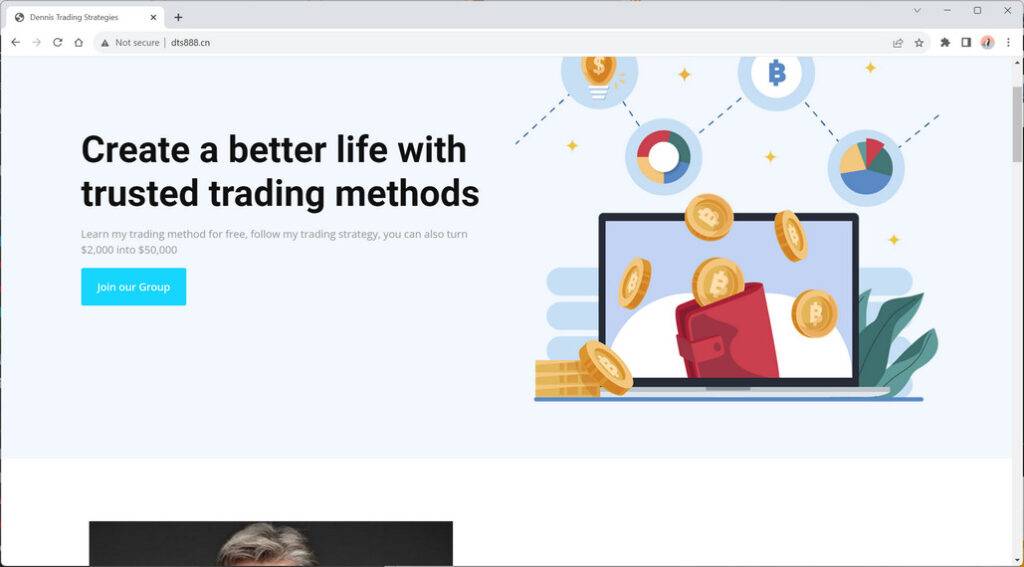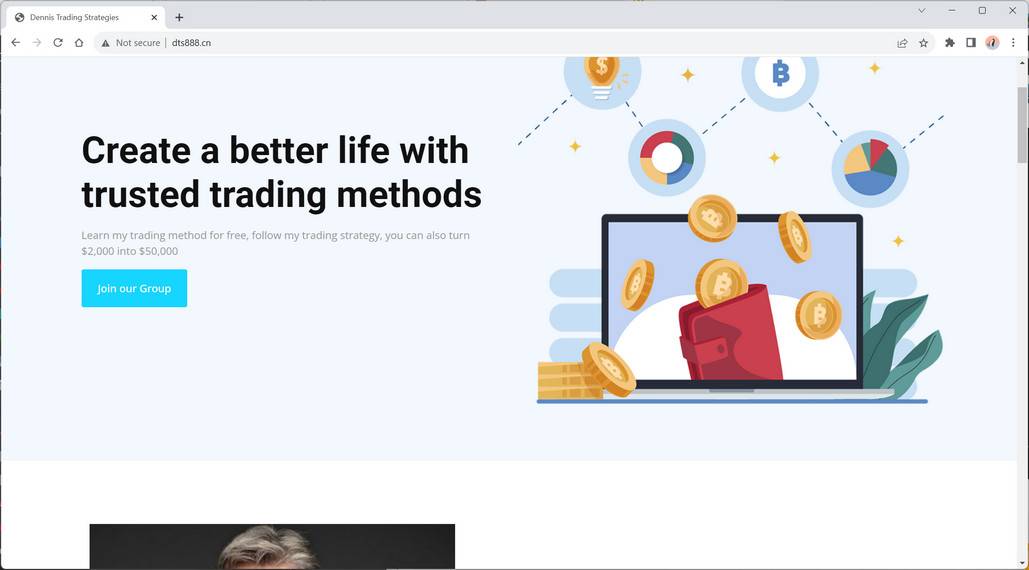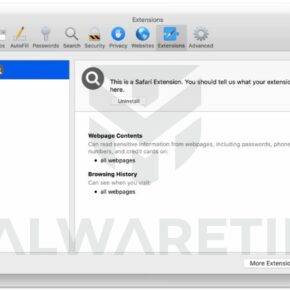A new cryptocurrency investment scam going by the name “Dennis Trading Strategies” has emerged on social media platforms like Facebook and Instagram. Promoted posts redirect to a website promising unbelievable Bitcoin trading profits if victims join a WhatsApp group for “Charles’ Investment Club.” However, this is a pure scam devised to steal money from unwitting victims wanting to invest in Bitcoin.
This article will break down how the Dennis Trading Strategies scam operates, techniques used to ensnare victims, major red flags to watch for, steps to take if you lost money, and tips to avoid cryptocurrency investment scams.

Overview of the Dennis Trading Strategies Scam
The Dennis Trading Strategies scam begins with social media ads or posts directing users to a website promoting an incredible new Bitcoin trading system. This site claims anyone can earn huge profits by following the trading methods of “Dennis,” an alleged crypto expert.
Victims are pressured to join “Charles’ Investment Club” via a WhatsApp group link where they are instructed to deposit money into a Bitcoin wallet address controlled by the scammers. However, there are no actual trading profits to be made. The criminals simply steal the money once deposited.
How the Dennis Trading Strategies Scam Works
The criminals behind the Dennis Trading Strategies scam put substantial effort into making their fraudulent trading program appear as legitimate as possible in order to deceive victims. They begin by establishing convincing social media profiles on platforms like Facebook, Instagram and Twitter where they pose as cryptocurrency trading experts or investors. These profiles seem authentic and include fake names, stock images, and completely fabricated backgrounds that tout many years of trading experience.
To distribute their scam ads widely, they pay for sponsored posts and social media advertising targeted at users who seem interested in Bitcoin, investing, or making money online. This enables their fraudulent offers to directly reach the feeds of many potential victims. The social media ads then redirect to a highly polished website with incredible claims about massive profits earned through using the trading secrets of “Dennis”, an imaginary crypto trader.
Bogus screenshots of accounts with huge balances are shown to reinforce the premise. The website also invents an entire false backstory depicting Dennis as a self-made crypto millionaire with unparalleled knowledge and a long track record of amazing results for his students. In reality, Dennis does not actually exist.
Promises are made that users can easily double or triple their money each month by following Dennis’ trading signals and techniques, despite the fact that no strategy can deliver such unrealistic guaranteed returns in unpredictable markets. Fake trust symbols like “Members Only” badges and doctored images showing media coverage are used as social proof to fabricate credibility so victims believe the scam’s claims.
High-pressure pop-up messages are also used, warning that availability is limited or the price will soon expire. This creates a false urgency intended to encourage victims to join quickly before missing out on the touted huge profits. Once hooked, victims are pushed to continue communication through WhatsApp or Telegram instead of the website. This allows anonymous transfers of funds while avoiding monitoring.
Instructions are then given to deposit funds into a specified Bitcoin wallet address in order to gain access to the Dennis system. This effectively transfers control of the victims’ money directly to the criminals. As soon as the deposits are made, the scammers disappear and stop responding, leaving victims unable to recover their lost.
How to Spot The Dennis Trading Strategies Scam
While scammers make this scam appear legitimate, there are key signs revealing it is a total fraud:
- Promises incredibly high, guaranteed profits from Bitcoin trading. No system delivers this.
- Pushy about sending money upfront before providing any actual trading advice or training.
- Communications shift to WhatsApp, Telegram, etc. to coordinate deposits outside of regulated systems.
- Refuse to provide audited trading performance reports. The advertised profits are completely fabricated.
- High-pressure tactics demanding you act fast or miss out on big profits. Scare tactics that you’ll lose the opportunity.
- No licensing, credentials, or documented history found online supporting the existence of any trader named Dennis.
Avoiding the Dennis Trading Strategies Scam
Use extreme caution any time online advertisements promise unrealistic cryptocurrency or Bitcoin trading profits. Here are tips to avoid this scam:
- Ignore social media ads about amazing trading systems or ROI guarantees. These are always scams.
- Research the company and founders. Check for licenses, certified credentials, and audited trading histories.
- Beware pressure to join chat apps like WhatsApp which cannot be traced. Never deposit funds via chat.
- Understand legitimate traders cannot guarantee returns. Markets are unpredictable. Consistent high profits are impossible.
- Reject demands to send cryptocurrency deposits upfront. This is the biggest red flag indicating a scam.
- Report suspicious ads to social networks. Legitimate companies won’t use predatory marketing techniques.
What to Do if You Sent Money
If you already deposited money to the wallet address provided, take these steps right away:
- Leave the WhatsApp group so scammers cannot continue communicating with you.
- Report the scam accounts and group to WhatsApp. Provide screenshots and details.
- Contact your bank or payment provider to flag the transactions as fraudulent. Inform them you are the victim of a scam.
- Report the scam to the FTC and FBI Internet Crime Complaint Center at IC3.gov with all pertinent details. The more reports submitted, the higher priority the investigation receives.
- Carefully monitor all transaction activity associated with the cryptocurrency wallet used. Freeze associated accounts if possible to prevent further theft.
Conclusion
The Dennis Trading Strategies scam reveals why extreme caution must be exercised when exploring potential cryptocurrency investments online. There are many convincing scams touting false promises of enormous guaranteed profits. But their only purpose is stealing money from victims.
Conducting thorough due diligence, following basic security practices, and never sending payments upfront can help you avoid these criminal schemes aiming to capitalize on the hype surrounding digital assets and blockchain technology.
Frequently Asked Questions
What are the warning signs of an investment scam?
Guaranteed high returns, pressure tactics demanding money upfront, unregistered entities, social media and chat app-based, refusing audits, unclear investment strategy details.
Can I get my money back if I fall for an investment scam?
Unfortunately it is very rare to recover lost funds sent via cryptocurrency as transactions are irreversible. Your only options are reporting to authorities and monitoring for follow-up theft attempts.
Are there legitimate crypto advisors I can follow?
Yes, but you must thoroughly vet anyone providing paid consultations. Check registrations, licenses, experience, audited performance histories, and be wary of extravagant claims.
What should I do if I shared my payment details?
Immediately contact your bank and any linked financial accounts to freeze transactions if scammers obtained your account or payment information. Change all passwords and enable multifactor authentication.
Who can I report crypto investment scams to?
Report to the FBI Internet Crime Complaint Center (IC3), Federal Trade Commission, state securities regulators, Consumer Financial Protection Bureau, and the platform where you saw the scam ads.





